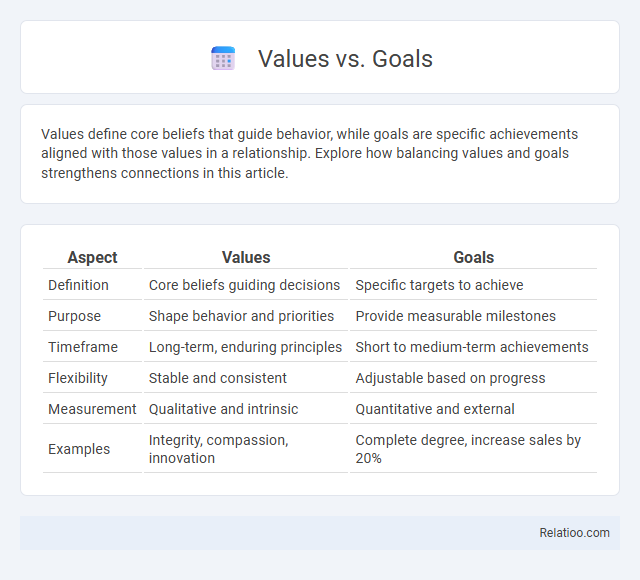Values define core beliefs that guide behavior, while goals are specific achievements aligned with those values in a relationship. Explore how balancing values and goals strengthens connections in this article.
Table of Comparison
| Aspect | Values | Goals |
|---|---|---|
| Definition | Core beliefs guiding decisions | Specific targets to achieve |
| Purpose | Shape behavior and priorities | Provide measurable milestones |
| Timeframe | Long-term, enduring principles | Short to medium-term achievements |
| Flexibility | Stable and consistent | Adjustable based on progress |
| Measurement | Qualitative and intrinsic | Quantitative and external |
| Examples | Integrity, compassion, innovation | Complete degree, increase sales by 20% |
Understanding the Difference: Values vs. Goals
Values represent enduring beliefs that guide behavior and decision-making, such as honesty or compassion, while goals are specific, measurable milestones aimed at achieving desired outcomes like career advancement or fitness targets. Understanding the difference is crucial because values provide a foundation for purpose and motivation, ensuring goals are meaningful and aligned with one's true priorities. Misalignment between values and goals can lead to dissatisfaction, whereas alignment fosters fulfillment and sustained commitment.
Defining Values: Core Principles that Guide Behavior
Defining values involves identifying core principles such as integrity, honesty, and respect that consistently guide individual or organizational behavior. These intrinsic beliefs shape decision-making processes and influence long-term priorities by providing a stable foundation for actions. Clear value definitions foster value alignment by ensuring consistency between personal or collective values and specific goals.
What Are Goals? Setting Specific Targets
Goals are specific, measurable targets individuals or organizations set to achieve desired outcomes within a defined timeframe. Setting clear goals involves identifying precise objectives that guide actions and track progress, enhancing motivation and performance. Effective goal-setting aligns with core values to ensure meaningful and sustainable success.
How Values Influence Goal Setting
Values form the foundation of your goal-setting process by guiding the selection and prioritization of objectives that resonate with your core beliefs. When your goals are aligned with your intrinsic values, motivation and commitment naturally increase, leading to more consistent and meaningful progress. Understanding this dynamic ensures your aspirations not only reflect what you want to achieve but also who you truly are.
Examples of Values and Corresponding Goals
Core values such as integrity, innovation, and sustainability often translate into specific goals like maintaining transparent business practices, launching five new product innovations annually, and reducing carbon emissions by 40% over five years. Value alignment occurs when individual or organizational goals consistently reflect these underlying values, ensuring cohesive decision-making and strategic growth. For instance, a company valuing community engagement may set a goal to volunteer 1,000 employee hours per quarter, demonstrating practical commitment to its ethical principles.
The Relationship Between Values and Long-Term Fulfillment
Your core values serve as guiding principles that shape your decisions and behaviors, directly impacting long-term fulfillment. Goals derived from these values ensure alignment between daily actions and genuine desires, fostering sustainable satisfaction. Value alignment acts as the bridge, creating coherence between what you stand for and the milestones you pursue, enhancing overall life meaning.
Aligning Your Goals with Your Core Values
Aligning your goals with your core values ensures that your actions and decisions reflect what truly matters to you, fostering authenticity and long-term fulfillment. Goals serve as specific milestones, while values provide the foundational principles guiding those objectives, creating a coherent roadmap for personal and professional growth. Achieving value alignment reduces internal conflicts and enhances motivation by keeping efforts consistent with deeply held beliefs.
Challenges When Goals Conflict with Values
When goals conflict with core values, individuals face ethical dilemmas that can lead to stress and decreased motivation. Resolving these conflicts requires a clear understanding of personal values and prioritizing long-term well-being over short-term achievements. Organizations often struggle with value alignment, as misaligned goals can result in reduced employee engagement and compromised integrity.
Strategies to Reconnect Goals to Values
Reconnecting goals to values involves evaluating if current objectives reflect core beliefs and adjusting plans to ensure meaningful pursuit. Techniques like reflective journaling, values clarification exercises, and establishing SMART goals aligned with personal or organizational values enhance motivation and clarity. Regular review sessions and feedback loops help maintain alignment, ensuring sustained commitment and authentic progress.
Values or Goals: Which Should Drive Your Decisions?
Values represent deeply held beliefs that shape behavior, while goals are specific, measurable outcomes you strive to achieve. Decisions driven by values ensure consistency and long-term satisfaction, whereas goal-driven decisions prioritize immediate achievements and results. Prioritizing values fosters authentic choices aligned with your identity, creating a foundation for meaningful goal setting and sustainable success.

Infographic: Values vs Goals
 relatioo.com
relatioo.com